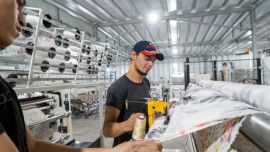Latin America’s heavily-indebted corporations are likely to delay rehiring workers during the recovery from last year’s slump, according to the World Bank.
The pandemic destroyed tens of millions of jobs from Mexico to Argentina while also leaving company balance sheets more fragile. Many businesses were kept alive by government debt forbearance programmes that deferred interest on loans.
The need to manage that debt load as these programmes come to an end “is exactly what’s going to prevent them from investing in new capital and hiring new workers,” said William Maloney, the bank’s chief economist for the region, in a video interview.
About 26 million people in Latin America lost their jobs last year, according to an International Labour Organisation (ILO) report published last week. In previous crises, the region’s low-skilled jobs market has taken as long as a decade to fully recover, while the market for high-skilled workers typically rebounds in less than two years, according to Maloney.
In several countries in Latin America, the percentage of firms saying that they are in arrears on debt payments or are likely to go into arrears exceeds 40 percent, according to a World Bank study. For companies that employ 20 workers or fewer the figure is even higher.
Domestic credit to the private sector in Latin America and the Caribbean rose to 60 percent of GDP in 2020 from 55 percent the year before, according to data from the World Bank.
Even before last year’s crisis, Latin American economies were growing too slowly to lift millions out of poverty at a fast pace, Maloney said.
To boost the long-term growth rate, governments should consider education reforms that better align universities to the skills and research that businesses need, Maloney said. Right now, the region has many university-educated graduates who struggle to find work in their fields.
“If you look at the Asian or Scandinavian miracles, there’s a very tight linkage between research outfits, research institutions and the productive sector and the incentives put by the state lead in that direction,” Maloney said.
by Oscar Medina, Bloomberg



















Comments